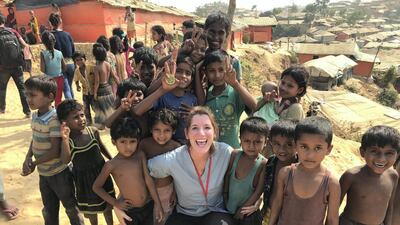Big-hearted caregivers from an Abu Dhabi clinic embarked on a vital mission of mercy in Bangladesh to bring fresh hope to embattled Rohingya refugees embroiled in the world's fastest growing humanitarian crisis.
Volunteer clinical staff from Cleveland Clinic Dhabi have spoken of the desperate plight of those living in camps in the impoverished country - who now face the deadly threat of monsoons having fled their native land in the northern Rakhine province of Myanmar to escape atrocities such as starvation, rape and mass murder.
About 900,000 Muslim Rohingya now seek solace in shanty tents made up of bamboo sticks and plastic in neighbouring Bangladesh following their exodus from what the United Nations has described as a textbook example of ethnic cleansing.
But respite from the horrors of their homeland could be short-lived, as monsoons look set to bring a new trail of death and destruction their way.
CCAD, working with charities and official relief organisations, treated as many as 200 patients a day, from babies to the elderly, for a range of conditions such as respiratory issues and parasitic infections.
Emergency department nurse, Elizabeth Gilmore spent a week in Bangladesh offering aid in April and says while the situation looks bleak, she has not given up hope of a brighter future for the long-suffering refugees.
Ms Gilmore said: "If you walk into the camp it is thousands upon thousands and thousands of people on top of each other in bamboo structures with tarp on top trying to get some sort of shelter from the heat and the rain.”
She says efforts have been trying to help the most at risk because of the monsoon season but so far only a few thousand have been moved
The people already suffer from common illnesses such as hypertension and diabetes to more serious diseases such as cholera and malaria.
“We saw things like mumps and measles which people generally would normally be vaccinated for," adds Ms Gilmore.
Recently there are efforts to vaccinate against cholera.
“We are hoping that cuts down on quite a bit of illness when monsoon season comes,” she said
Ms Gilmore has volunteered across the globe - but says this crisis is particularly disturbing due to the fact so many in need find themselves in a country facing its own problems.
She adds: "I was in Nepal in 2015 because of the earthquake and while it was a natural disaster with all their own people and their own resources but here there are coming into an already impoverished country that can hardly provide for its own people.
______________
Read more:
Myanmar crisis: Rohingya militants say unilateral truce to end on October 9
Rohingya crisis: Disheartening precedent for refugees seeking to stay in India
______________
"You walk into the camp and as far as your eye can see, there are people. These people have gone through something I hope no one ever goes through again.
"One of our translators there has a friend who is working with children and they do some art therapy there and I was able to see some of these pictures of what the children have gone through and it is massacres of people and vilages being burned, people hanging on trees, hundreds of people drowned in the sea."
The focus now is on drafting in even more volunteers and providing funding to tackle the impending monsoons.
"There is hope but it will take a really long time to figure out how to care for 900,000 refugees,” Ms Gilmore adds.
Cleveland Clinic Abu Dhabi volunteers who went to Bangladesh included five Emergency Medicine Institute Consultant physicians, an Emergency nurse, and a Director of Infection Prevention & Control.
“Cleveland Clinic Abu Dhabi is proud to have caregivers who are prepared to offer their time and expertise to people in need, especially in the Year of Zayed, where we celebrate the compassion and generosity of the Founding Father of the UAE,” said Dr. Jacques Kobersy, Chair of the Emergency Medicine Institute, Cleveland Clinic Abu Dhabi.
Dr. Christian Halloran, Chief of Operations for the Emergency Medicine Institute at Cleveland Clinic Abu Dhabi, who was also one of the volunteers, added: "
“The scale of the challenges – the number of refugees and the diversity of health problems we encountered – were daunting, but the experience reminded me of why I decided to practice medicine. Even though we had to improvise and did not have the resources and technology that we have in Abu Dhabi, we had an important impact on the lives of people in the camps.”

